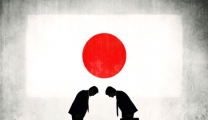Japan has been famous for its work culture that global enterprises can learn and adapt for their business growth and solidification of their own culture. Below are 25 most interesting things about Japanese business culture shared by those having spent years working for Japanese companies. Explore them and you will see why those practices are so effective; they have positively changed people’s behavior.
14. Work for value
The Japanese often try hard to become valuable persons, rather than successful persons. They work for value and strive to bring best values to customers.
15. Don’t fire employees but try to train them to become better
Japanese companies won’t fire employee unless he/ she wants to leave. No matter how bad the employee’s performance is, the company will find ways to train and help him/ her improve.
There is often a person in charge of training new comers to Japanese companies. The Japanese want their new hires to adapt and work in line with their working styles.
16. ROI of relationships
PDCA cycle – a method used for control and continuous improvement of processes and products
U.S enterprises focus on Return on Investment (ROI) or the end result. They don’t concern themselves on how it’s attained. U.S firms spend less time establishing their process. Japanese focus on ROI, too. Still, they shed light on the process on how to get there. For instance, they assess how to create the process for the project and include the cost of building the process.
17. Risk adverse cultures
For American employees, if you ask something to achieve for them, they will say “We can do it”, even they thought they can do it 50%-70% probabilities. After they accepted, they endeavor to attain as close to 100%. They are called the risk takers.
Meanwhile, if the Japanese feel that it is possible to attain most likely 100%, they don’t say “yes”. Their agreement is careful as they want to be accurate. They want to ensure it’s exactly 100%. What the Japanese say is significant. If they aren’t right, it will reflect badly on them.
18. Homogeneous cultures
Because U.S is multicultural, the firm comprises lots of nationalities, which means there are so many different ways to think. In most of situations, they don’t progress without saying anything.
New hires at Japan Airlines Co. gather in a hangar at Haneda
Meanwhile, basically, a Japanese enterprise is organized by Japanese. Just about everyone has the same background to realize the situation; that’s why there don’t need spoken words for some of the understanding. This is one of important communication skills in Japan.
19. Professional life
In Japan, priority is on the working life. Work is the center of their life. There are lots of traditions re-enforcing this. A new comer to the firm hold the place for flower viewing (Hanami) to enjoy cherry blossom in Spring and drink with co-workers. A common after-work event is drinking party (Nomikai) and used as a really important opportunity of communicating with each other for work.
20. Venerate business cards

The business card exchange is a fashion of expressing the importance that one places on the encounter. It shows you value the meeting just as you will value the future ones. A meeting in Japan begins with a formal and ceremonious exchange of business cards. When receiving a card, the businessman uses both hands to take it, reads it over carefully, repeats aloud the printed information, and places it on the table in front of him or in a cardholder, referring to it in conversation when necessary. He never drops it in his pocket because that is deemed disrespectful.
You will look silly, or even mocking if you do exactly this routine in some other countries. Still, when you receive a business card, take the time to absorb information on it. You will look rude if you just cram their card flippantly in the closest pocket.
21. Defer to the elders

In a meeting in Japan, directing one’s initial comments to the highest ranking person present is customary. One never disagrees with that person, and always gives him the due attention. When bowing (the standard Japanese greeting), one should always bow the deepest to the most senior man.
The Japanese business culture values the elders for the wisdom as well as experience they give to the company. In Japan, age equals rank, so the older the person is, the more important he is.
Then how you can adapt it? Defer to those above you in the corporate ladder or with seniority. If you don’t agree with a manager, express your grievances in private, and don’t question his authority in front of the group. Just acknowledge that people are advanced to higher levels due to their skills and experience.
22. Instill motivation through slogans

Many Japanese companies start their working day with the morning meeting that employees line up and chant the corporate slogans as a manner of inspiring motivation and loyalty, and as a way to keep the corporate goals fresh in their minds.
You can adapt it by reminding yourself each time you sit at your work desk what you are working for. Refresh your long-term goals in your mind and be aware of how essential team-work is to attaining there. Keep a handy checklist of your own slogans for you to reference them when you feel doubtful or discouraged.
23. Keep a straight face

Workers in a Japanese office often remain expressionless, especially during meetings. Humor is rarely used, except for light banters during breaks. There is seldom any physical touching among fellow workers, and certainly no backslapping. The Japanese workers speak in a measured tone, and often close their eyes when they pay close attention to a speaker – a habit mistaken for a sign of boredom by foreigners.
For us, overly formal working place seems oppressive. You don’t have to treat your office like a sacred ground though, there’s also no reason to treat it like the house of your buddy. Professional appearance and conduct raise respect for work and in return, raise work productivity.
24. Work hard, play hard

During work, the Japanese work their best.

When play, they play hard, too.
After a day of grueling negotiations, Japanese employees are ready to cut loose. Barhopping is common after work. If the working place is stiff, ceremonial, the bar is somewhere that Japanese businessmen pull off their inner beast. Karaoke bars and nightspots are also their favorite places. In nightspots, fellow workers bond and share information, thereby reinforcing affiliation with the team.
Overall, after tense hours of work, you can attend office parties to socialize and become informal with coworkers outside the working place, which will help balance their work-life and lower your guard for a bit.
25. Avail connections as an endorsement

In Japan, connections are really important, and often referred to as an introduction to negotiations. Cementing relationship with powerful persons gets you taken seriously in other circles. Commonly, businessmen arrange meetings with high ranking executives just to request their endorsement. It’s especially impressive if the endorsement is from a person of the same rank as the one you’re dealing with.
Wrap up
Different cultures can teach us something about success and inspiration in our own corporate culture. Just like flavoring food with exotic spices, adding some foreign elements to your working life can make it special. Leverage the Japanese model, it will help your employees shine more in the workplace.

















Replies to This Discussion